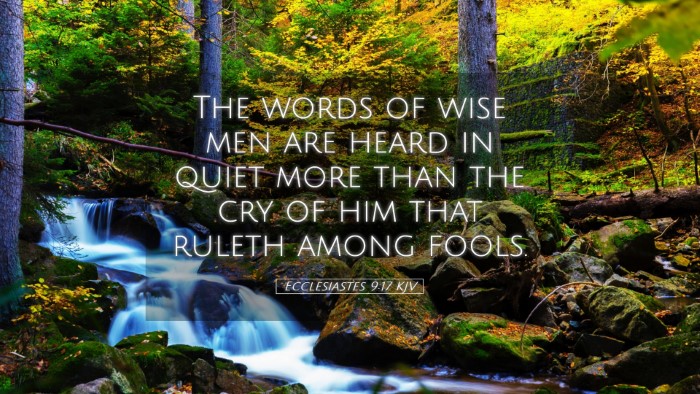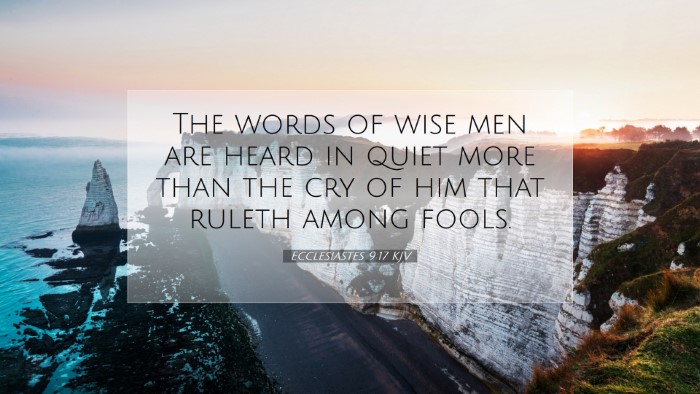Ecclesiastes 9:17 Commentary
Verse Text: "The words of wise men are heard in quiet more than the cry of him that ruleth among fools."
Introduction
Ecclesiastes 9:17 presents a profound observation regarding the reception and impact of wisdom versus folly. The writer, traditionally attributed to Solomon, reflects on the nature of wisdom and the often overlooked yet significant influence of wise counsel. This commentary synthesizes insights from public domain sources such as Matthew Henry, Albert Barnes, and Adam Clarke to provide a comprehensive understanding of this verse.
Contextual Background
The Book of Ecclesiastes addresses existential thoughts on life, its meaning, and the pursuit of wisdom amidst life’s futility. In this context, the teacher (commonly identified as Solomon) seeks to convey the value of wisdom against the backdrop of earthly endeavors void of lasting significance. The verse in focus contrasts the quiet strength of wise words with the louder yet less meaningful proclamations of authority and foolishness.
Analysis of the Verse
This verse can be broken down into two main components:
-
The Value of Wise Words:
The first segment emphasizes that the words of the wise are "heard in quiet." Matthew Henry comments on the intrinsic quality of wise counsel, which resonates profoundly even in silence, highlighting the earnestness and depth of genuine wisdom. Wise individuals often present their insights with humility, contributing to their reception over the more ostentatious declarations of those in power.
-
The Futility of Foolish Authority:
The latter part of the verse contrasts wise counsel with "the cry of him that ruleth among fools." Albert Barnes provides a reflection on the nature of authority, asserting that mere position among fools leads to a cacophony that drowns out valuable wisdom. The cries of rulers who lack wisdom do not carry weight or merit, suggesting that influence without substance is ultimately ineffective.
The Nature of Wisdom and Its Reception
Adam Clarke elaborates on the nature of wisdom, asserting that it often goes uncelebrated in a world enamored by more visible forms of power and authority. He notes that the quiet delivery of wisdom can have a remarkable impact, shaping thoughts and guiding actions without demanding attention. This exemplifies the biblical principle that true wisdom is often characterized by meekness and clarity rather than bombast and arrogance.
The Application of Ecclesiastes 9:17
The applications of this verse are manifold, particularly in pastoral and theological contexts:
-
Pastoral Leadership:
For pastors and church leaders, this verse serves as a reminder to foster environments where wisdom can be expressed and received, valuing the quiet contributions of members who may provide profound insights over those who speak loudly or hold positions of prestige.
-
Theological Reflection:
Theologically, this verse challenges scholars to prioritize the study of humble wisdom over worldly achievements. It emphasizes that God's truth often comes from unexpected sources and that discernment is key in recognizing and valuing true wisdom amid the noise of folly.
-
Personal Growth:
Individuals are encouraged to seek out wise counsel and be attentive to it, rather than being swayed by the loud voices of the foolish. It advocates for a reflective approach to gaining wisdom, emphasizing the worth of subtlety in guidance.
Conclusion
Ecclesiastes 9:17 provides a dichotomy between the quiet wisdom of life and the often-overbearing noise of foolish authority. The insights gleaned from public domain commentaries affirm the richness of this verse in highlighting the enduring value of wisdom. As we navigate an often tumultuous world, it is imperative to develop ears that can hear the subtle, yet profound, truths conveyed by wise individuals, allowing those insights to guide our lives in ways more significant than mere loud proclamations could ever achieve.


